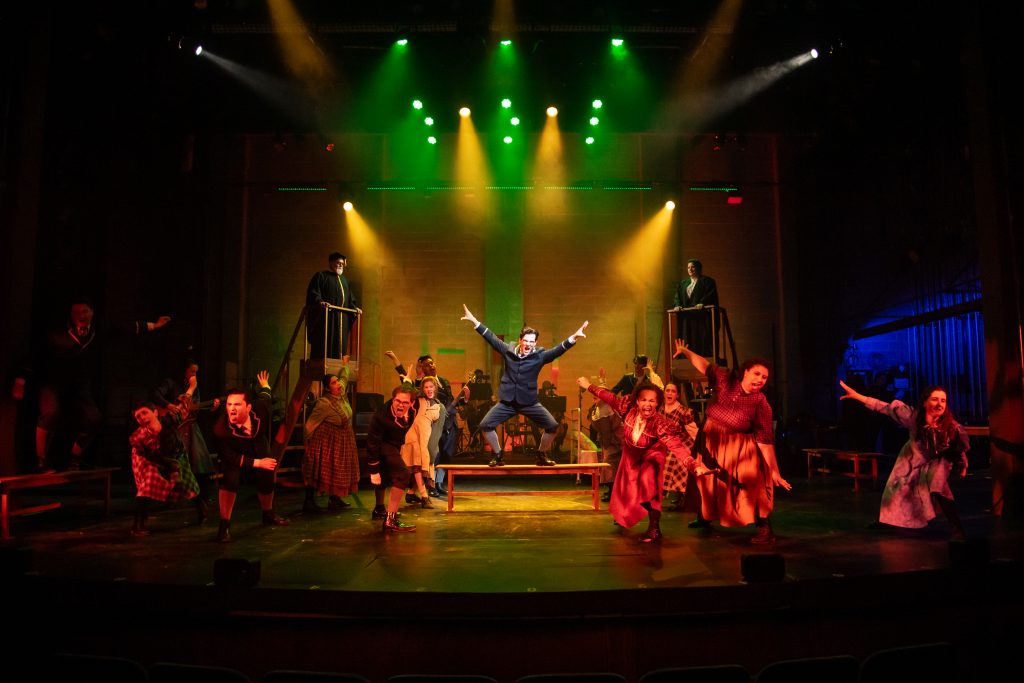‘Spring Awakening’ Is a Powerful Show
It actually shut down Skylight's electrical system Friday night. It's a must-see musical about teen angst beautifully performed by hearing and deaf actors.
The carefully laid patches of fog so suitable for Spring Awakening overloaded the Cabot Theatre stage opening night only five minutes from the end of one of Skylight’s best and most provocative musicals. The fire alarm howled, the red lights flashed, so the audience dutifully streamed out into the cold night and, most of them, waited the half hour for the fire department’s all clear to re-enter.
With applause – for the show as well as themselves — they resumed their seats for a closing that now lacked the backwall projections, the scattered set pieces and the haunting lighting that helped make the musical so remarkable. But the interruption also turned the audience’s attention to what really made the difference — the lingering vision embodied by this show, which the finale summed up.
The audience wanted to share the spirit – the devoted unity of a large mainly unknown cast, 19 in all, the power of actors becoming each other (in some cases literally), the sonorous impact and meaning of the music and the staging innovations.
Both hearing singers and American Sign Language actors merge invisibly as they ride wheeled bed, school tables and platforms to convey the teen rebellion. Aside from that cast of 19, there are six expert players of string instruments upstage, including bass and cello, anchored by music director and keyboardist Eric Svejcar and the punctuation and ever-surprising underlays of a Skylight perennial, percussionist Michael (Ding) Lorenz.
There is a huge assortment of behind-the-scenes experts and technicians who helped bring this off. The production is another remarkable testament to the theater skills of artistic director Michael Unger and his willingness to believe in collaboration.
Here he co-directs with Alexandria Wailes, a noted deaf actress, with a host of sign language (ASL) interpreters, technical consultants and movement experts, all operating together seamlessly, along with musical and sound experts too numerous to count. They are working with some wonderful thematic compositions from Duncan Sheik and lyrics by Steven Sater.
Group movement enters a new dimension under choreographer Reed Luplau (Wailes also has a choreography background). As constant movement distracts our eye, the choreography combines shadows, group marching, interlaced hands and comic contortion. You don’t have to know ASL signs (though it helps) to get caught in the flow.
This is an unusual theater piece, regarded as a rock opera when it took New York by storm in 2006 and then evolving a new life years later on Broadway in the version the Skylight has adopted – a mix of deaf, hearing and hard of hearing actors who meld into one vision of adolescent angst and poetry, combining voice, artistic movement, ASL interplay and episodic scenes (we know we’ve moved from pasture to bedroom to school to cemetery largely through some pieces of furniture and the places and words splashed on the back wall).
Here are all the horrors and joys of puberty – sex, masturbation, gossip, beatings, flagellation, parental discipline, adolescent defiance, dark poetry and suicide. There is a story hanging all this together, but a review shouldn’t tell you.
Be warned that the older generation of parents and teachers doesn’t come off well. Though this is based on an 1890s play, first performed in 1906 and written by Frank Wedekind (a sex-obsessed daddy of expressionism most famous for the Lulu plays) the parental reliance on fear and discipline has some modern echoes. It is no wonder the production is also a fund raiser for groups set up to help the mentally challenged, the displaced and the LBGTQ teens among us.
The original 19th century setting lives on – not just in Misti Bradford‘s dark costumes of schoolboy suits and girl shifts but by the phrasing of language, despite the sometime blunt lyrics and provocative behavior. We are artistically shown, even in evocative sign language, the erotic desires and anxiety of the young of that era, and also still of our era.
There are some interesting choices of sound and silence in the casting. While left to do his own screaming and guttural moans, Joseph Saraceni performs Moritz, the manic student, with overflowing mimed emotion. But his frequent lyrical singing voice is artistically delivered at his side by Edie Flores. Similarly, Erin Rosenfeld is a wonderfully expressive Wendia, the lead love interest for intellectual bad boy Melchoir, while singer Emma Knott perches next to her as dutiful, equally expressive subordinate. They both become one in our eyes.
In the main part of Melchoir, Caden Marshall’s looks and penetrating tenor high notes exactly capture Spring Awakening‘s Germanic spirt as he slides from troublemaking intellectual to sensitive friend. Since his Melchoir is Wendia’s love interest, his dialogue is often mouthed but also echoes on the soundtrack or from a stage ghost. There are other such dual characterizations as well as some expert singing, in duets and separately, by Kaia Fitzgerald and Teagan Earley.
But this is one of those productions where leaving someone out is as misleading as putting someone in. It is the unity of the cast in song, in setting the moods, in wandering through brief characterizations to emerge whole at the end, that really grabs the audience.
The 2006 audacity of Spring Awakening was putting modern rock melodies and behavior into an 1891 play, suggesting a fierce adolescent unity of despair censored then and freer now. The new version adds the dimension of how we disregard the deaf community and its gifts, which should be welcome additions to our artistic language. The show doesn’t say that. It just demonstrates it.
There are some other differences from the 2006 Broadway version, designated by many as a rock opera. Now that is something of a misnomer. Gone are the handheld mikes, the group stomping, the electric guitars. Now the music is mainly moaned by the strings, the power comes from voices raised in glorious harmony, the harsh words conveying lament as well as anger. It’s a different show, and I think a better one.
In its youth, the opening night audience may not have been typical of Skylight’s subscription base, which is usually older and less prone to pick up on suggestive sign language. I just hope they are as open as this crowd was to the sad beauty of troubled youth.
Spring Awakening runs through March 17 at the Cabot Theatre in the Broadway Theatre Center. For tickets, call 414-291-7800 or visit https://www.skylightmusictheatre.org/
If you think stories like this are important, become a member of Urban Milwaukee and help support real, independent journalism. Plus you get some cool added benefits.
Review
-
Eating Burmese in Bay View
 Dec 13th, 2025 by Cari Taylor-Carlson
Dec 13th, 2025 by Cari Taylor-Carlson
-
Casablanca Is a Milwaukee Success
 Nov 30th, 2025 by Cari Taylor-Carlson
Nov 30th, 2025 by Cari Taylor-Carlson
-
Oh, Those Witty 18th Century Brits
 Nov 24th, 2025 by Dominique Paul Noth
Nov 24th, 2025 by Dominique Paul Noth
Theater
-
Oh, Those Witty 18th Century Brits
 Nov 24th, 2025 by Dominique Paul Noth
Nov 24th, 2025 by Dominique Paul Noth
-
Skylight’s Holiday Show Is Lots of Fun
 Nov 16th, 2025 by Dominique Paul Noth
Nov 16th, 2025 by Dominique Paul Noth
-
Rep’s ‘Come From Away’ Is a Triumph
 Nov 10th, 2025 by Dominique Paul Noth
Nov 10th, 2025 by Dominique Paul Noth





















